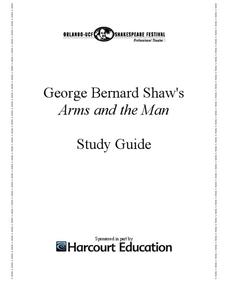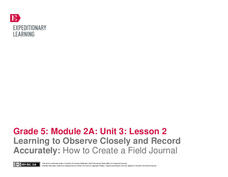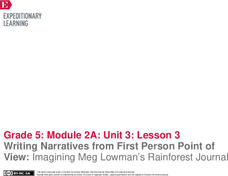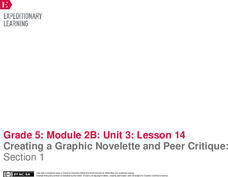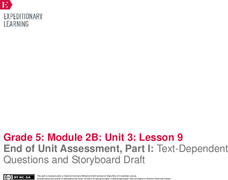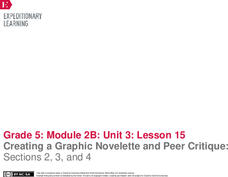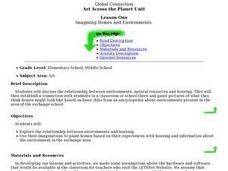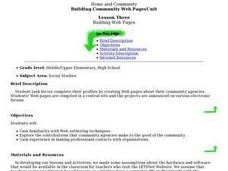Orlando Shakes
Arms and the Man: Study Guide
Few aspects of life make better fodder for a comedic play than politics. A study guide introduces George Bernard's Shaw comedy Arms and the Man. Along with summaries of each scene and brief biographies of the main characters, two lesson...
Feedbooks
Little Women
The March sisters (Meg, Jo, Beth and Amy) have delighted readers for more 100 years—and they continue gaining young fans every day. An eBook of the classic novel, Little Women, provides a more modern look, but it does so without...
US Department of Commerce
Looking at Numbers of Births Using a Line Graph
Was there a baby boom? Using census data, class members take a look at the number of 8-11 year olds and determine their birth years. Scholars create a double line graph to compare the number of births for two states for several years....
EngageNY
End of Unit 2 Assessment: A Hosted Gallery Walk
Speak your mind. Scholars present their claims in groups of three. They use a presentation checklist as each member takes a turn. At the end of the lesson plan, pupils complete an End of Unit 2 Assessment: Presenting a Claim and Findings...
EngageNY
Presenting a Research-Based Claim: Effective Speaking Techniques
Take note. Scholars receive their claim drafts back to revise and write their claims and three pieces of evidence on notecards. They save the notecards to use when the verbally present their claims to the class. At the end, individuals...
EngageNY
Forming a Research-Based Claim: Cascading Consequences Chart
Can you put that in writing? Scholars work with a partner to write a practice claim before writing their own claims. After writing their claims, learners share with class using a Concentric Circles activity.
EngageNY
Forming a Research-Based Claim: Creating Stakeholders Charts
Present the facts. Scholars create presentations of their research on DDT using their Cascading Consequences chart and a
Stakeholders Impacts chart as visuals. They discuss the term stakeholders and create a Stakeholders Impacts chart...
EngageNY
Learning to Observe Closely and Record Accurately: How to Create a Field Journal
Look carefully. Scholars practice observing and recording the natural world around them by looking out a window or viewing an image. Learners discuss how their experience compares to that of Meg Lowman in The Most
Beautiful Roof in the...
EngageNY
Writing Narratives from First Person Point of View: Imagining Meg Lowman’s Rainforest Journal
I spy with my little eye! Learners observe page 23 in The Most Beautiful Roof in the World and practice what they would add to a field journal. They discuss how details from the text help add to their thoughts. To finish,...
EngageNY
Creating a Graphic Novelette and Peer Critique: Section 1
Help the class put a plan in place. With the detailed resource, pupils plan the first section of their graphic novelettes about an invention, creating and labeling their pages. Next, they work with partners to give and receive feedback...
EngageNY
Storyboard Revision: Managing the Sequence of Events and Using Sensory Details
Mastering techniques from the resource, pupils give life to their writing, revising their storyboards to include sensory details and transitions. To finish, they participate in a peer critique process and use the feedback to further...
EngageNY
End of Unit Assessment, Part 1: Text-Dependent Questions and Storyboard Draft: “You Can Do a Graphic Novel” Excerpt
Eyes on the finish line. Serving as the first part of the end of unit assessment, learners answer questions based on a text about how to write a graphic novel. Using what they've learned, they then create a storyboard about the invention...
EngageNY
Creating a Graphic Novelette and Peer Critique: Sections 2, 3, and 4
Let's get creative! With the fun resource, pupils continue working on their graphic novelettes about an invention, adding text and images to each section. When finished, they engage in a peer critique process, giving and receiving...
Smithsonian Institution
What's the Code? Coding Robot Movements Using Sound
Tap into the desire to learn about computer codes. Pupils apply the Tap Code and the Polybius Square to send secret codes using sound. They design a code that tells a robot what movements to make and then test out their code using one of...
EngageNY
Mid-Unit Assessment: Analyzing a New Narrative about a Natural Disaster, Part II
See it through my eyes. Scholars complete mid-unit assessment part II by writing an essay describing how the narrator's point of view influences how the story is told in the text In the Middle of the Storm. Pupils also complete a...
Curated OER
Six Day War
Learn about the diverse perspectives involved in the Six Day War by having learners examine and annotate presidential speeches given by the three nations—Egypt, Israel, and the United States—at the heart of the conflict and producing...
Curated OER
Earth Day Trash Survey Unit
Young scholars develop an action plan to prevent trash from becoming a problem in the future.
Curated OER
Earth Day Trash Survey Unit
Students analyze the data from questionnaires to prepare a report. They distribute the report via e-mail or through a report published on a Web page to those who participated.
Curated OER
Exploring Homes and Resources
Young scholars search for images of and information about the exchange country's environments and housing, using a variety of sources, and evaluate primary sources of information in terms of accuracy and usefulness.
Curated OER
Imagining Homes and Environments
Learners discuss relationship between environments, natural resources and housing, establish connection with students in classroom or school there, and paint pictures of what they think homes look like based on basic data about environment.
Curated OER
Letters to Local and State Legislators
Pupils locate their local or state legislator's address. They write and send letters to their local and state legislators critiquing their voting record on environmental issues and sharing their own views on these issues.
Curated OER
Environmental Voting Records of Legislators
Young scholars collect and record data on the environmental voting record of their local and state legislators using the Internet. They identify examples of environmental problems or endangered species in their state.
Curated OER
Building Web Pages
Students examine local community agencies and their contributions to the community. They create Web pages that profile the community agencies and their interviews with the volunteers.
Curated OER
Sharing Information
Students collaborate with another classroom via the Internet to share data, questions, results, and check the validity of their testing procedures.


